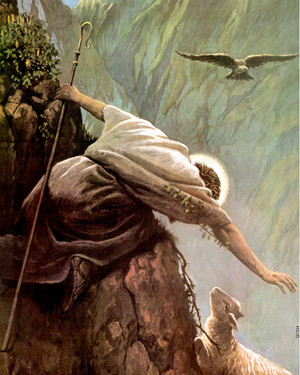Christianity is not just a "personal" religion, addressed to private spirituality. Nor is it an exclusive club living by a set of rules and norms, lost in the idea of "institution." It is a lifestyle, a way of being in the world that is simple, nonviolent, shared, and loving. Today's parable calls every one of God's people to respond to the poor, the suffering, the hungry, the refugee and the outcast. The Lord addresses two groups of people. Both groups do not recognize the presence of God in others. But only one group is welcomed into the Kingdom.
 Though they did not recognize they were doing anything for Christ, or acting in his name, they shared what they had with those who did not have. They simply did what came naturally to them. We all know people like that. They may not be in the pews with us every Sunday, but they are with us making sandwiches for street people on Monday.
Though they did not recognize they were doing anything for Christ, or acting in his name, they shared what they had with those who did not have. They simply did what came naturally to them. We all know people like that. They may not be in the pews with us every Sunday, but they are with us making sandwiches for street people on Monday.It is Christ who urges us to respond to these needs in others, just as he did. We are to have the mind and the heart of Christ. The scene shows that judgment is not going to be based on some arcane theological point or some work that will take an enormous effort to achieve. Norms for the judgment are simple. Did we take care of the most pressing problems of the needy? Did we address their hunger, thirst, being a foreigner, lacking clothes, illness and imprisonment?
What gives us hope and vision in the middle of this broken world is our recognition of the presence of Christ in one another.
The truth is that we are all called into God's kingdom. The Gospel reminds us that the kingdom is present whenever people act lovingly towards others. And into this kingdom will come people from the four corners of the earth. We might have too narrow a perspective of who is part of the kingdom, limiting membership to our own religious community or those who believe as we do. The parable that Jesus teaches today is not so limiting. People will be invited in who didn't even recognize Christ in the needy they served. They just helped and aided those whom they saw with eyes of compassion.
Jesus is a king whose strength was compassion, not power. And salvation is about Jesus setting us free. It is an exodus experience. It is a pilgrimage - a movement from being imprisoned to being set free, from being bound to being released from bondage, from darkness into light, from fear to trust, from arrogance to insight and understanding.
This is the kingdom we inherit: Emmanuel. We are carriers of a new vision. We are dreamers of His dream that all may be one, loved and accepted as persons of immeasurable value. We are the bearers of life, nurturing it in all of its myriad manifestations. We are the reminders that truth, goodness and beauty are to be pursued and enjoyed. We are called to be servants of the Word, open and vulnerable to its transforming power. We are a community of disciples who live simply, love tenderly and act justly.
We are challenged to be people of Church - faithful to who we are; choosing to live the present with an awareness of the past and an openness to the future... giving thanks that God has first loved us, and shared His life with us that we might freely give ours for the life of the world.
The approaching season of Advent is not one that celebrates the anticipation of the birth of a baby in Bethlehem. It reminds us that this child has already been born. He lived, suffered and died for us, and He is with us still - Emmanuel. This is the King who leads us beyond ourselves as we encounter the mystery of a God beyond all imagining. This is the King who leads us into ourselves as we contemplate the wonder of who we are. This is the King who leads us towards others as we accept the challenge of incarnating God's presence on earth - as courageously and as lovingly as He did.
This is the Shepherd King who gathers all to himself and beckons: "Come, blessed of my Father..."
The Lost Sheep painting by Alfred Usher Soord





